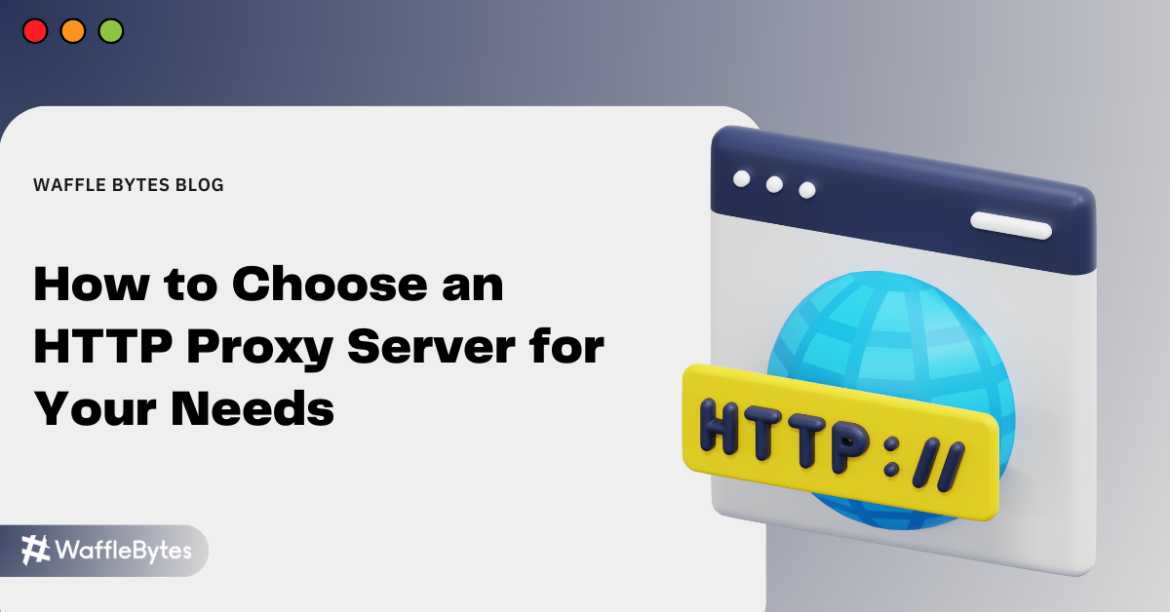The right HTTP proxy server can make all the difference in your online experience, whether you’re managing web scraping projects, optimizing security, or ensuring seamless browsing. But with so many options available, how do you determine which proxy server best suits your needs? Let’s break it down step by step, considering key factors such as speed, security, compatibility, and pricing.
Understanding HTTP Proxy Servers and Their Role
An HTTP proxy acts as an intermediary between your device and the internet. When you send a request, the proxy forwards it on your behalf, fetching the data before delivering it back to you. This setup can enhance security, optimize performance, and even provide access to geo-restricted content. However, not all HTTP proxies are created equal—some offer high-speed connections with minimal latency, while others focus more on anonymity or data encryption.
The best proxy server for you depends on your use case. Businesses often require proxies for data mining, SEO monitoring, or social media management. Meanwhile, individuals may need them for personal browsing, gaming, or enhanced security. Understanding your specific needs is the first step toward making the right choice.
Key Factors to Consider When Choosing an HTTP Proxy
1. Speed and Performance
Nothing is more frustrating than a slow proxy server. If speed is a priority, look for providers that offer high-performance proxy servers with low latency. The speed of an HTTP proxy depends on several factors, including:
- Server location – The closer the proxy server is to your target website, the faster the connection.
- Bandwidth limits – Some providers impose bandwidth caps, which can slow down your browsing or scraping tasks.
- Server load – Overloaded servers result in sluggish performance, so opt for providers with a large proxy pool and dedicated resources.
If you’re using a proxy for large-scale web scraping, performance should be a top concern. A proxy that frequently times out or delivers incomplete data will disrupt your workflow and hinder efficiency.
2. Security and Anonymity Levels
Not all HTTP proxies provide the same level of privacy. Some expose your real IP address, while others offer full anonymity. Here’s what to check when assessing security:
- Anonymous vs. transparent proxies – Anonymous proxies hide your IP address, whereas transparent proxies reveal it to the destination server.
- Data encryption – While HTTP proxies do not encrypt data like HTTPS proxies, some providers offer enhanced security features.
- Logging policies – Always verify whether the provider keeps logs of your activities. A no-log policy ensures maximum privacy.
For users handling sensitive data or conducting business operations, investing in a secure and reliable proxy service is crucial.
3. Compatibility and Use Case
Different proxies serve different purposes, so selecting one that aligns with your intended use is essential. Here are a few scenarios where HTTP proxies play a critical role:
- SEO monitoring – Marketing professionals use proxies to track keyword rankings across multiple locations.
- Ad verification – Businesses check how ads appear in different regions without triggering automated fraud detection.
- Web scraping – Developers and analysts extract data from various websites without getting blocked.
- Social media management – Agencies manage multiple accounts without triggering platform restrictions.
Ensure the proxy you choose supports your specific applications, including browser integration or software compatibility.
4. Residential vs. Datacenter Proxies
When browsing proxy options, you’ll likely come across residential and datacenter proxies. Understanding the differences is crucial:
- Residential proxies – These use real IP addresses from internet service providers (ISPs), making them less likely to be blocked. They are ideal for web scraping and ad verification but tend to be pricier.
- Datacenter proxies – These come from cloud providers and data centers, offering faster speeds at a lower cost but are easier to detect and block.
Choosing between these depends on your goals—if you need maximum reliability, residential proxies are better. If speed is your priority, datacenter proxies might be the way to go.
5. Pricing and Subscription Plans
While free proxies exist, they often come with security risks, slow speeds, and unreliable uptime. Paid proxies, on the other hand, provide:
- Better reliability and uptime guarantees
- Faster speeds with lower latency
- Dedicated customer support
Look for a provider that offers flexible pricing plans, allowing you to scale based on your needs. Some services charge per gigabyte of data, while others offer unlimited plans for a monthly fee. Compare different providers before committing to a long-term plan.
Where to Buy Reliable HTTP Proxies
Once you’ve determined what you need in an HTTP proxy server, the next step is choosing a trusted provider. A reputable provider should offer high-speed, secure, and scalable solutions tailored to your use case. If you’re looking for reliable options, you can buy HTTP proxy from a trusted service that guarantees quality and performance.
Final Thoughts
Selecting the right HTTP proxy server requires careful consideration of speed, security, compatibility, and pricing. Whether you’re using it for web scraping, SEO, or enhanced security, choosing a high-quality proxy can significantly improve your online experience. Take your time to research and test different providers to find the one that best meets your needs. After all, a well-chosen proxy server is the key to efficiency, security, and seamless browsing.

